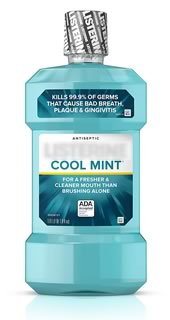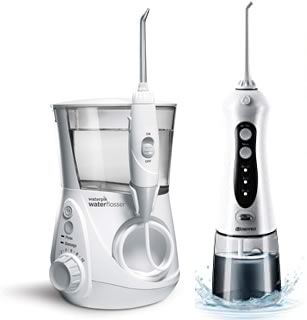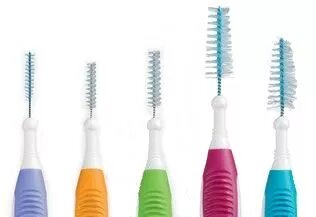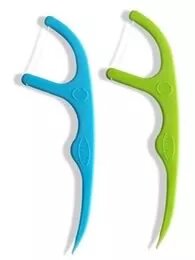 ?
?
While they will never replace proper toothbrushing with toothpaste and floss, over the counter mouthwashes, oral irrigators, tongue scrapers and Proxabrushes and floss picks and sticks can also be helpful in maintaining your oral health.
Tips to Help you Choose Additional Dental Care Products
MOUTHWASH

Mouthwashes can help control or reduce bad breath, gingivitis, plaque and tooth decay by strengthening enamel and killing bacteria. Cosmetic mouthwashes temporarily reduce mouth odor and provide a pleasant taste. Therapeutic mouthwashes, in addition to cosmetic effects, have beneficial health effects. You may distinguish therapeutic mouthwashes from cosmetic mouthwashes by noting their active ingredients.
Active ingredients contained in therapeutic mouthwash include:
- Chlorhexidine (CHX) – maintains a lower level of plaque
- Essential Oils – e.g. menthol(mint), thymol (thyme), methyl salicylate (wintergreen), and eucalyptol (eucalyptus) – penetrates plaque and kills bacteria
- Quaternary Ammonium Compound Cetylpyridinium Chloride (CPC) – kills bacteria and yeast.
- Fluoride – strengthen enamel substructure
- Hydrogen Peroxide – oxygenation penetrates plaque and kills bacteria
Select a therapeutic mouthwash and in order to preserve the effectiveness of fluoride toothpaste, floss your teeth first, then rinse with mouthwash for 30 seconds before brushing your teeth.
ORAL IRRIGATORS

Significant reduction in bleeding, gingivitis and periodontal disease-causing bacteria in patients has been demonstrated in patients without periodontal disease following daily oral irrigation. In patients with mild to moderate periodontal disease daily oral irrigation has been shown to promote the same effects.
Countertop models hold more water and offer more options and pressure control. Portable irrigators use less countertop space, are handier for travel and some are made for use in the shower. Reservoir size, adjustable pressure and flow controls, types of tips and nozzles vary between the various models. Mouthwash may be combined with water in oral irrigators to enhance the benefits of irrigation,
Waterpik’s WP-660 is the 2020 top selling countertop model and Mospro’s 300ml IPX-7 is the top selling portable model on Amazon. Both perform well.
TONGUE SCRAPERS
If your tongue is less pink than white on the surface, you have a coated tongue. Coated tongues indicate a buildup of debris, bacteria and dead cells lodged between the papillae on the tongue surface. A coated tongue can be caused by smoking, dry mouth, poor oral hygiene, yeast infection or medication use. Coated tongues may cause bad breath. The bacteria harbored on coated tongues promote tooth decay and gum disease. Brushing your tongue gently with a toothbrush and toothpaste works well for mild coating. Tongue scrapers do a better job when the coat on the tongue is thicker.
Tongue scrapers come in plastic, stainless steel and copper versions. Plastic, disposable tongue scrapers may be more hygienic and less likely to cause damage if accidentally used too vigorously.
INTERDENTAL BRUSHES

An interdental brush is often referred to as a Proxabrush. It has a plastic handle and a small head of bristles held together by a wire. Proxabrushes are flexible and clean better between the teeth and under bridges than floss picks as they scrub the sides of the teeth and undersides of bridges. Proxabrushes are a good alternative for patients with limited mobility. Unfortunately, like floss picks and sticks, Proxabrushes do not properly clean below the gumline.
Proxabrushes come in a variety of sizes and the bristles are made of silicone or nylon. Select the Proxabrush(es) that work best to fit into the size of spaces between your teeth.

FLOSS PICKS AND STICKS
A floss pick is a plastic handle with a u-shaped end that holds a piece of dental floss between its posts. Floss picks do not have bristles on the end, so they primarily remove larger particles of food from between the teeth. Unlike Proxabrushes floss picks do not adapt well to the tooth surfaces. Unlike string floss, the tightly held floss of floss picks limit its ability to properly clean below the gum line and around each tooth. Floss picks remove pieces of food from the contact areas of the teeth better than Proxabrushes, but they do not clean the tooth surfaces as well because the floss on them is held rigid. Care must be taken with the pointed stick end of some floss picks not to injure the gum tissue between the teeth.
In case you missed it, see the essential oral hygiene products article.


